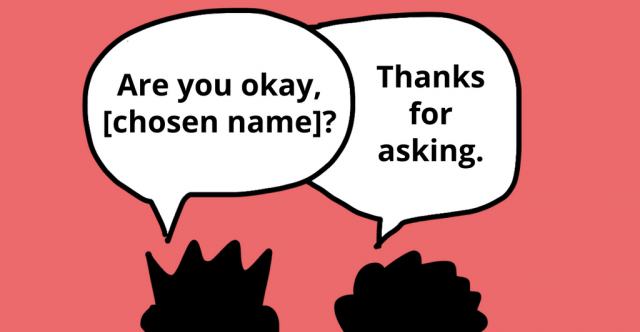
Nick*, one of our teen patients, will occasionally be taking over the blog to talk about gender identity, mental health, and more.
We’ve covered a few of the biggest no-no’s that come with having someone who is trans* in your life, but what are some things you can say to actively support and encourage these friends?
Here today, I’ll be covering some things that those friends of yours might be longing to hear, things that are definitely going to be putting a grin on their faces when you say them.
1. “Hey, [Chosen Name]!” / ”He began his transition from female to male recently, so try to use the right pronouns.” / ”They are non-binary.”
Oh boy, sometimes I wonder if people genuinely realize just how wonderful it is to hear your chosen name come out of someone else’s mouth without a follow up comment on how hard it is to remember. It can be so refreshing, so joy-inducing to have someone use your chosen name so simply, even though it may seem like a small thing. Using a friend’s chosen name is the easiest thing on this list—It should always be a no brainer. It’s just a name in the end. How would you feel if every time someone said your name, it was quickly followed with a, “Gee, that’s so difficult to remember”?
It’s understandable that you may slip-up at the beginning; just apologize quickly and move on with the conversation. The same goes for pronouns! Using someone’s preferred pronouns should be a given, though it is still a wonderful, effortless way to validate your friend midsentence. You don’t always have to be waving a pink, white and blue flag to support trans* folk, people—just use preferred pronouns and names!
2. “I have some old clothes that I’m not going to use anymore. Want to come over and see what you like?” or, “Should we go shopping?”
For binary trans men and women, clothing is often one of the key elements to transitioning! An invitation like this is usually going to be a winner because you’re offering up so much with just a few simple words. You’re offering support and validation to a friend while also giving the two of you an opportunity to just hang out. Plus, it’s always fun to just have a day for clothing. Helping a friend explore this part of their identity can be a great way to bond and just understand them better. It’s a wonderful way for your friend to figure out how they want to dress themselves in a safe and supportive environment. You don’t even have to buy anything in the end—just looking at different styles and trying on clothes can be a great experience! And if you’re trying to be frugal, you can always do a clothing swap. It can be a lot less nerve-wracking to try things on in the comfort of a friend’s home.
All of this being said, if your friend says that they aren’t ready to go shopping, don’t force them. Shopping for clothes may create anxiety for them. Your friend may be worried about being outed and judged by strangers or running into people they know. Trying on clothes may also trigger feelings of dysphoria. Even if your friend doesn’t want to try on clothes with you now, they’ll still appreciate the offer and know that they can turn to you when they do want help with clothing decisions.
3. If your friend is DFAB (Designated Female at Birth): “Do you need to borrow a pad?” or, “Are you okay?”
I can’t ever stress this enough—This one can be a total life saver when you’re DFAB. Some DFAB folks out there don’t really feel comfortable carrying menstrual products after beginning to present more masculine or androgynous. Carrying pads or tampons can feel like a sign advertising that you’re trans*, almost like an enormous red flag. Offering to lend a hand (and a pad) when you know your friend is on their period can be an enormous help—just make sure to do it discreetly, so no one else overhears.
Remember, though, that periods can be a tough time for some trans* people who are DFAB. Talking about their period may cause some dysphoria as well. Ask them about how their period affects them, and how you can be helpful. Going out with your friend to buy menstrual products (or just doing it for them!) may be greatly appreciated, as this can also be a dysphoria trigger. It’s also possible that the best thing you can do for them is just be extra supportive when you know they’re on their period. Be discreet, keep up with being helpful, and you’re shooting for absolute gold.
That’s all for today, beautiful readers! Keep it going with the good work at being amazing friends to those trans* folk in your life—take what you’ve learned today and go forth and be great!
A quick note, beautiful readers: I use “transgender*” and “trans*” as they’re more inclusive terms than without the asterisk. The asterisk in the name is commonly used throughout the community to acknowledge non-binary people within the trans* community, whose identities are often delegitimized and erased. As someone with more than a few non-binary folks close to me, I prefer it in my writing.
Nick E.* is sixteen years old and writes about sexuality, gender, and mental health, among other topics. He also enjoys reading and writing his own short fiction stories.
*Not the author’s real name.
The Mount Sinai Adolescent Health Center is located in New York City. It provides comprehensive, confidential, judgment free health care at no charge to over 10,000 young people every year. This column is not intended to provide medical advice, professional diagnosis, opinion, treatment or services to you or to any other individual, only general information for education purposes only.


